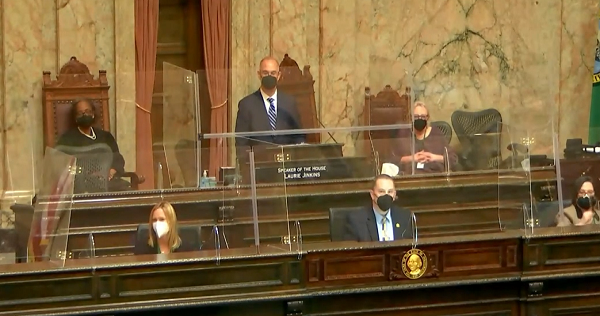
The indifference and arrogance proliferating from low-level elected officials has become appalling. To clarify, this is readily apparent on both sides of the aisle, as the majority of contemporary politicians lack decorum, accountability, or critical thinking skills outside of identifying a great networking opportunity with the fervor of a chamber of commerce membership director.
While the tiresome shenanigans of city and county officials can at least be understood based on limitations and incompetence, the state representative level of over-educated naivety remains insufferably cumbersome on the level of Kathy Griffin. The insatiable egomaniac desperately chases the proverbial fire truck to a disaster in brusquely trading a lack of talent for camera time despite the element of human misery involved.
Enter stage left Washington state politician Patty Kuderer, who supposedly represents all of her constituents in Kirkland, Washington, an affluent suburb of Seattle, that is for now buffered from the homeless industrial complex and perpetual crime scene of the city by a lake and two floating bridges. If the former attorney and her progressive colleagues of Vandana Slatter, Amy Whalen, and Suzan DelBene realize their vision of transforming a nice place to live into a perpetual nightmare through tax-payer dollars and questionable methods, the dream of a utopia will be horrific for law-abiding citizens and small businesses.
Recent attempts to contact Kuderer were unsuccessful, in raising concerns about Governor Jay Inslee retaining emergency powers that have stretched for nearly two years, and the alarming rider outlining facial recognition technology haphazardly placed within a carbon credit bill (HB 1091) that was unfortunately passed into law. The difficulty in having one’s voice heard by an elected officials on either side began decades years ago when politicians began skirting visits from the public, redirected phone calls to interns, and answered written letters with a canned response. Historically, representatives were not wary of criticism and actually approachable in a community setting to hear an idea or two.
In today’s cold and sterile world of digital innovations and communication advances, emails and voicemails are simply ignored, even though legitimate issues are brought to the attention of what should be the most accessible compartment of government for the average citizen. The experience with Kuderer is just one example of many, on how tone deaf those in power have become in hiding behind a firewall, and a snarky support staff. In the neighboring legislative district Democratic state senator Larry Springer, a rare moderate in the region’s insane political tapestry, failed to answer a similar correspondence targeting the controversial language of HB 1091, though his administrative assistant at the very least sent a response indicating that she had forwarded the message to the proper destination.
With the evolution of social media, the rabbit hole has been warped to a gaping elephant crater, in offering a pedestal for politicians and citizens alike to author proclamations that incite the masses through the ebbs and flows of glittering data constituting the viral lifecycle. Within this frenetic bombardment of abbreviated thought measured in microseconds, vast amounts of information simply doesn’t register with the neighborhood processing speeds of the human brain prompting an instinctive response. This results in a landscape more conducive to the reactionary, a mentality embraced by the left spectrum of the ideological spectrum, and a scattering on the fringe zone on the extreme edges.
A look-in to Kuderer’s state senator official Twitter account is a more frightening experience than ingesting the new Old Navy advertising campaign celebrating diversity, diversity of the human form that is. Amid obese people dancing like sugar plum fairies, extreme posts on homelessness, heavy government spending, and the obligatory “it is still all Trump’s” fault dot the politician’s digital wall. Interestingly, even though there still exist a sizable pocket of conservatives who are professionals and home owners in her district, Kuderer and others are not bashful with a brash in the face online approach in admonishing any perspectives that inhabit the right side of the ledger through unnecessary condescending rhetoric. She also retweeted a fellow politician’s celebration of the state and Governor Jay Inslee signing a “high magazine capacity” anti-gun bill into law, a deplorable development that is in all probability headed to the courts prompted by Second Amendment advocates battling against the restrictive measure.
While the lack of communication between elected officials and the average citizen is disappointing, what only makes it worse in the case of Kuderer is that “government” transparency is listed as an important issue in her mission statement on her official website. Ironically, the inability to follow up on a pressing concern with an individual that may not share her ideology is either a deliberate acrimonious act, or a red flag indicating that her staff is not efficient enough to respond to members of the public contacting the office through the proper channels.
In highlighting the flaws of the bureaucratic process to a politician, one at least expects at timely response to constructive feedback that may have been overlooked by the daunting flood of information which passes through the average lawmakers desk during the course of a legislative session. However, there are no excuses for apathy in at least entertaining a differing thought, even though the politics may not resonate with one’s platform.
When an idea is cancelled and with no hope of a productive conversation, the future of free will looks bleak.